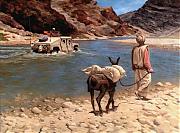I’ve been traveling around Iraq for more than a week, spending time with U.S. forces. One constant is complaints about the news media. “Why doesn’t the press show the good we’re doing?,” soldiers ask. They wonder why the coverage seems so slanted.
Part of the answer is that the soldiers’ tactical successes may not be adding up to strategic success. Another part of the answer is undoubtedly the bias of the press—not only against the war but also in favor of negative news. But another important factor is the ham-handed reticence with which the military makes its own case.
The conventional military mindset sees the media as a potential enemy to be shunned at all costs. Officers who get quoted too much are derided behind their backs as “glory-seekers” or “self-promoters.” The focus is always supposed to be on the team, not the individual, and there is a general assumption that good deeds will speak for themselves. General George Casey, the former U.S. commander in Iraq (now about to become Army chief of staff), exemplified this point of view. He seldom spoke to the media and tightly limited who could speak on behalf of his command.
The result of such caution is to cede the “information battlespace” to critics of the war and even to outright enemies such as Osama bin Laden and Moqtada al Sadr, who have shrewdly manipulated press coverage. General David Petraeus, the new U.S. commander in Iraq, wants to engage more actively in what are known as “information operations,” and he’s off to a good start...












Bookmarks